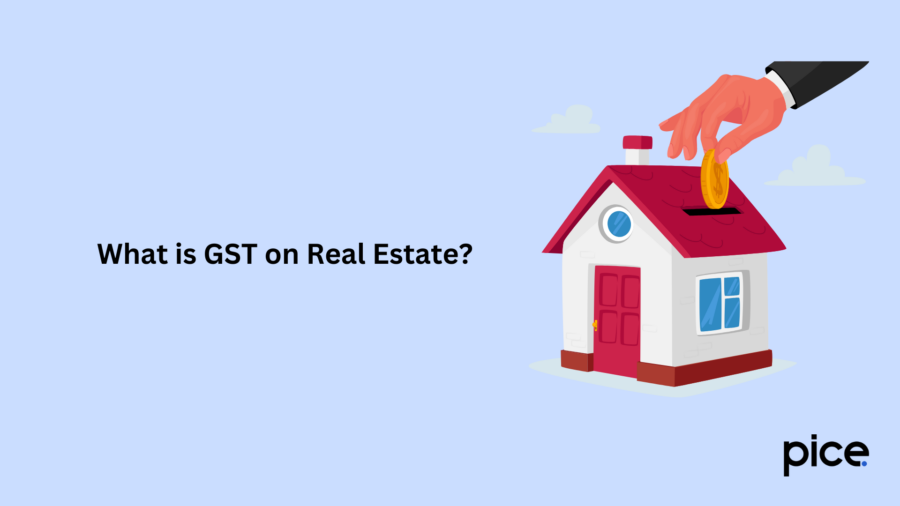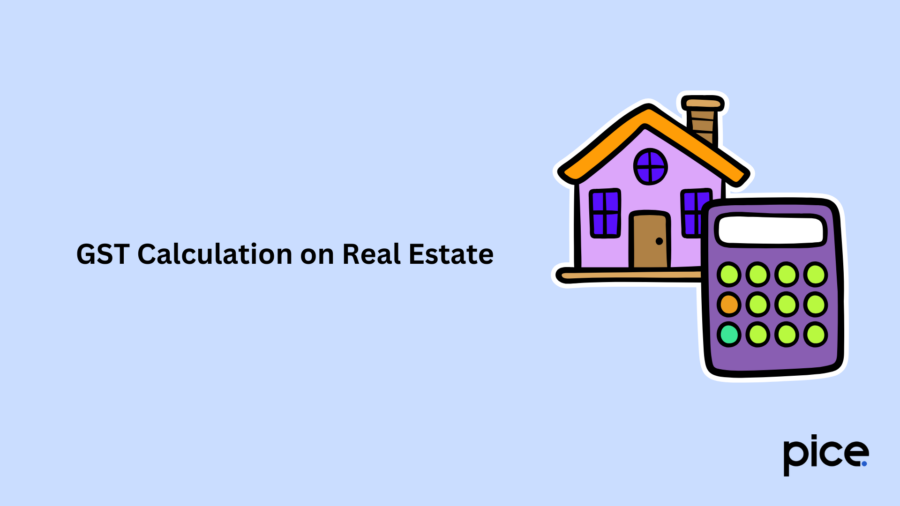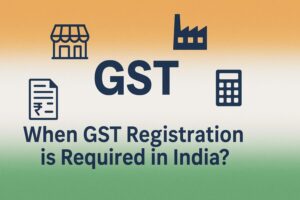GST on Real Estate Sector
- 18 Dec 24
- 10 mins

GST on Real Estate Sector
Key Takeaways
- GST applies only to under-construction properties, exempting ready-to-move-in flats with a Completion Certificate.
- Affordable housing enjoys a reduced GST rate of 1%, making it more accessible for buyers.
- Luxury properties are taxed at 5% GST but do not qualify for Input Tax Credit (ITC).
- Developers benefit from GST by availing ITC and reduced construction costs, promoting affordability.
- Resale properties, land transactions, and completed flats are exempt from GST, simplifying tax obligations.
Real estate industry is one of India's primary sectors and an important pillar of the economy. After the 2008 financial crisis, the government has taken significant measures to boost the real estate market.
The Goods and Services Tax (GST) has significantly reshaped the taxation landscape in India, and its impact on the real estate sector has been transformative. In this blog, we will explore the intricacies of GST on real estate sector, and other key aspects associated with it.
What is GST on Real Estate?

Homebuyers and investors pay GST when investing in under-construction properties. Prior to GST implementation, homebuyers were required to pay multiple indirect taxes, such as Value Added Tax, registration charges, stamp duty charges, service tax, etc.
With the implementation of GST on real estate properties, homebuyers need to pay taxes applicable only on under-construction properties. You do not need to pay GST on ready-to-move-in or completed properties with a Completion Certificate.
GST Taxation on Real Estate
Take a look at the table below showing the applicability of Goods and Services Tax on real estate:
| Particulars | Rate of GST |
| Properties that are still under construction (houses which are bought under credit-linked subsidy) | 8% |
| Properties that are still under construction (excluding the other) | 12% |
| Resale Properties | – |
| Ready to Move Properties | – |
| Land purchase and sale | – |
| Composite Supply of works | 18% |
| Works contract | 18% |
| Composite supply of works to the government authority | 12% |
| Composite supply for public use | 12% |
| Composite supply of works contract for affordable housing | 12% |
Impact of GST on the Real Estate Sector
The real estate sector in India has a contribution of about 7.3% to the GDP of India. After the IT industry, the real estate sector generates maximum employment. The implementation of GST on the real estate property sector aims to bring more transparency in the functioning of the real estate sector and solve challenges associated with it.
The impact of GST can be in terms of under-construction properties, affordable housing and luxury properties:
1. In cases of luxurious properties, the taxation of GST led to an increase in the luxury property owners's savings. The revised GST rate is 5%. However, for such properties, there is no availability of the Input Tax Credit (ITC).
2. To increase the demand for under-construction properties, the competent authority has decreased the GST rates. Under GST, the buyers also receive tax benefits for the interest that they pay.
3. The rate of GST on affordable housing segment is 1%. This is highly advantageous for the buyers.
4. Stamp duty charges are between the rate of 5% and 10% and registration charges are generally 1% of the property's value.
Impact on Affordable Property
With GST, homebuyers now have a clearer understanding of their tax obligations, offering greater transparency in the process. Even a small reduction in GST rates allows buyers to save more on their property, making it more affordable.
Significantly, the GST for under-construction houses priced below ₹45 lakh and those under government-supported housing schemes is just 1%.
Take a look at the table below to compare GST on affordable housing properties pre and post April 1st 2019.
| Affordable Housing Properties | GST on affordable housing (pre-1st April 2019) | GST on affordable housing (post 1st April 2019) |
| Cost Of Property (per sq ft) | ₹5000 | ₹5000 |
| Tax rates on the purchase of residential flats | 8% | 1% |
| Amount of GST (per sq ft) | ₹400 | ₹50 |
| Input Tax Credit benefit for construction material of ₹2000 @ 18% | ₹360 | N/A |
| Total amount of GST | ₹5040 | ₹5050 |
Impact on luxury property
With Goods and Services Tax, the tax burden on homebuyers is significantly reduced. After the 34th Meeting Council Meeting, apartment prices have reduced from 12% to 5%. The new rate of GST applicable on luxury properties enables buyers to save on their purchase of luxury properties.
However, it is important to remember that you are not eligible to claim Input Tax Credit (ITC) on the purchase of luxury properties.
Impact on under-construction property
Over the past few years, the demand and sale of under-construction properties have decreased considerably. In order to increase sales of these properties, the government has raised the limit for tax deductions on interest payments for housing loans.
Additionally, the government of India has also decreased the rates of GST. This initiative is advantageous for both developers and home loan buyers. With this initiative, developers can sell stocks faster and are not liable to pay taxes on piled-up inventory.
Impact on registration charges and stamp duty
Under GST for real estate, there has been no impact on registration charges and stamp duty charges. The registration charge is valued at 1% of the value of the property. However, it is subject to change by the state. The state is eligible to charge according to the standard fee. In the case of stamp duty, the rate varies between the range 5% to 10%.
You do not need to pay Goods and Services Tax on the registration of flat registration. Both registration charges and stamp duty charges constitute a large part of the revenue, the states can either give up these charges or bring the same charges under the regime of GST.
GST Calculation on Real Estate
You can calculate an estimated amount of GST on property by considering the cost of the property, the applicable rate of GST and other applicable charges. The computation of GST liability is done by the adding the Central GST and the State GST.
For example,
Total Goods and Services Tax = State Goods and Services Tax + Central Goods and Services Tax
Let us understand this calculation with an example:
If an under-construction property worth ₹2,000 is sold to a homebuyer. The amount of GST on the property will be calculated after the calculation of the standard abatement applicable to under-construction properties.
After a deduction of 33%, ₹660 will be the land value. The calculation of GST on the property will then be on the remaining ₹1,340 by the implementation of applicable rates.
GST Exemptions on Real Estate

Some exemptions of Goods and Services Tax on real estate properties are as follows:
- As per Schedule 3 of the Goods and Services Tax Act, 2017, ready-to-move-in properties are not a part of the goods and services category. It is similar to the act of buying or selling a property. Therefore, GST is not applicable on ready-to-move-in properties with an authentic Completion Certificate.
2. Individuals do not need to pay Goods and Services Tax on the sale and purchase of land and resale properties.
3. Under the GST system, real estate developers are eligible to claim the ITC on construction material. To claim these, there are certain conditions that the developers need to meet. Some of them are:
- Submitting receipts or invoices for
- construction material
- The developer needs to receive goods and services
- Any kind of claims of goods and services for personal use are not taken into consideration
- Filing of GST needs to be done accurately
- Clearance of pending dues is mandatory
Significant Factors About Goods and Services Tax on Real Estate
There are certain important factors that you must keep in mind about the Goods and Services Tax on real estate:
1. Under the regime of GST, 15% of a residential property is treated as commercial property, the property will be treated as residential property.
2. Landowners need to pay tax only on the basis that the tenant is a commercial firm.
3. The applicable rate of Goods and Services Tax on a commercial unit is 12%.
4. After the application of Goods and Services Tax, the under-construction houses are less expensive than ready-to-move-in housing projects.
5. Goods and Services Tax is also applicable on various services like processing fees, legal fees, etc. that are related to home loans.
Impact of Goods and Services Tax on Developers
Before GST implementation, developers were subject to multiple indirect taxes like Value-Added Tax (VAT), excise duty, customs duty, service tax, etc. Additionally, Input Tax Credit (ITC) was not available for some of these. As a result, the buyers were not also required to pay a higher price as the burden of the high pricing was shifted to the buyers.
However, the applicable Goods and Services Tax on under-construction flats has decreased construction costs by providing Input Tax Credit (ITC) and subsuming the existing indirect taxes.
Rates of GST on Construction Materials
The rate of GST applicable on construction materials are:
| GST on Construction Materials | GST Rates |
| Building bricks | 5% |
| Crude Granite/ Marble Rubble | 5% |
| Roofing Tiles | 5% |
| Fly Ash Blocks | 5% |
| Natural Sand (For Construction) | 5% |
| Marble / Granite Blocks | 12% |
| Glass for construction purposes | 18% |
| Refractory bricks/tiles | 18% |
| Prefabricated structural components for building | 18% |
| Marble/Granite (other than blocks) | 18% |
| Portland/slag cement | 28% |
Apart from the above, some of the rates of GST on construction services are as follows:
| GST on Key Construction Services | Applicable Rate of GST |
| Properties under construction eligible for the Credit Linked Subsidy Scheme | 8% |
| Composite supply of works contract for affordable housing | 12% |
| Properties under construction (excluding those under the Credit Linked Subsidy Scheme) | 12% |
| Composite supply of works contracts to government agencies / local government bodies | 12% |
| Works Contract (other than government bodies) | 18% |
| Composite supply of works contract ( affordable housing / other than government agencies/ local government bodies) | 18% |
GST is however not applicable in the following cases:
1. Resale of properties
2. Purchase or sale of land
3. Sale of ready-to-move-in flats
Conclusion
It is advisable for home buyers to consider a few important things before investing in the real estate sector. For example, individuals should consider their investment timeline, as real estate is most effective when held as a long-term asset. Knowing the implications of GST on real estate sector will help you make an informed investment decision.
💡If you want to streamline your payment and make GST payments, consider using the PICE App. Explore the PICE App today and take your business to new heights.
 By
By 
















